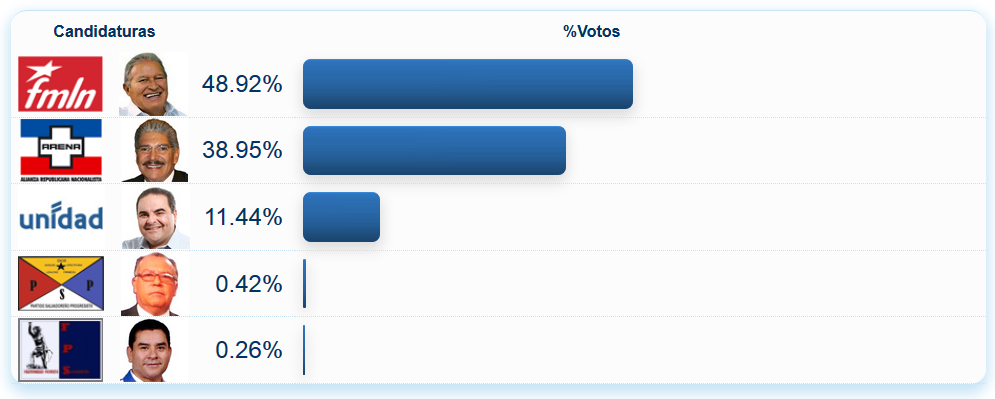EspañolNearly 5 million Salvadorans were eligible to vote yesterday in the Central American nation’s presidential election. With a turnout of 53 percent, the latest results indicate a run-off between Salvador Sánchez Cerén of the Farabundo Marti Front for National Liberation (FMLN) and Norman Quijano of the Nationalist Republican Alliance (ARENA).
The Supreme Electoral Tribunal (TSE) began tallying the votes at 5 p.m. CST on Sunday, in its operations center at the Crown Plaza Hotel in San Salvador. The Tribunal has been equipped with an electronic system for scrutiny, managed by INDRA. The first results became available on the TSE website from 5:30 p.m., and they revealed an undeniable preference for the FMLN.
To date, 99.16 percent of the polling stations have completed counting. Sánchez Cerén leads the presidential race with 48.92 percent of the vote, while Quijano has 38.95 percent. Antonio Saca, former president and candidate for the Unity Movement (Unidad), is in third place with 11.44 percent.
The other two contenders displayed very poor performances in the polls: neither Oscar Lemus of the Salvadoran Patriotic Fraternity (FPS) nor René Rodríguez Hurtado from the Salvadoran Progressive Party (PSP) reached 1 percent of the vote.
Transparent Election, Stronger Democracy?
The electoral process proceeded normally with no anomalies registered, as the Inter-American Union of Electoral Organizations and the TSE stressed in a press conference held on Sunday afternoon.
The TSE sought to promote a very transparent process, during which it made available the necessary information for all constituents to exercise their votes. The Salvadoran organization also enabled people to scrutinize the results in a fast and accessible manner through its website.
Incidents were minor, primarily included delays to the opening of polling stations. Even though ARENA complained about the possibility of electoral fraud, the five presidential candidates accepted the results released by the TSE.
Regarding the election, Jose Carlos Mejía, president of the Movement 300 — a civil society advocacy group — declared that the election “developed with the same normality as the previous election.”
This is the fourth presidential election since the end of the Civil War in 1992, and after the signing of the peace settlement in Chapultepec, Mexico, in the same year. However, it is the first time a former member of the guerrilla has participated in such an endeavor.
Nonetheless, the development of transparent and orderly elections is no guarantee of a robust democracy. In fact, Mejía notes that the TSE lacked the necessary strength to promote clean campaigns. For example, only on Sunday afternoon did the entity stop the screening of several advertising spots on television signed by the Presidency of El Salvador. These violated the electoral ban and the prohibition on proselytism by public officials.
Members of the Movement 300 declare that during the campaign such violations were exceedingly frequent: officials were using spots in the media, inaugurating civil works before time, and talking about their future projects when the ban on campaigning was already in place. The TSE failed to penalize any of these actions.
Even worse, Mejía believes that the TSE actions were cowardly. They appeared to like “having a wildly popular president, [and that] made the tribunal unwilling to confront the executive.”
Mejía claims that Salvadoran democracy is yet to mature and strengthen. He declares that the Supreme Court of Justice has ensured the proper procedures according to the Constitution and its institutions. However, “the Chamber of the Court, the secretary general, and the Supreme Electoral Tribunal are highly important bodies, but they are a 100 percent in the service of the ruling political party.”
“The people have said they want to choose their government representatives. But the control of the institutions by the ruling party is voracious. Democracy is in danger here,” Mejía argues.
The Polarization of Salvadoran Society
Sánchez Cerén and the FMNL hold a reputation as the leftist or Marxist party of El Salvador. This maintains a division that persists in Latin America since the days of coups and democratic instability — where the military was the “right” and the communist guerrillas the “left.” These results from the elections show a polarized electorate in the same manner.
The election will be equally divided in the runoff. Sánchez Cerén reached almost 50 percent of the vote, but the opposition doesn’t fall far behind. The “right” that corresponds to ARENA and the Unity Movement reached almost the same proportion, considering that the voters were divided between Tony Saca and Norman Quijano.
Saca has already served as president of El Salvador, elected through the ARENA party. However, the party dismissed him, and he decided to create his own for this election. Quijano, in turn, was the official candidate for ARENA, and this situation divided the voters of the Salvadoran right.
With such a small margin between candidates, going into the second round on March 9, the necessity to vote consciously increases considerably. Mejía notes that the results will certainly “impose a challenge to the Supreme Electoral Tribunal to manage the second round correctly.”
Translated by Isabella Loaiza Saa.
 Versión Español
Versión Español













